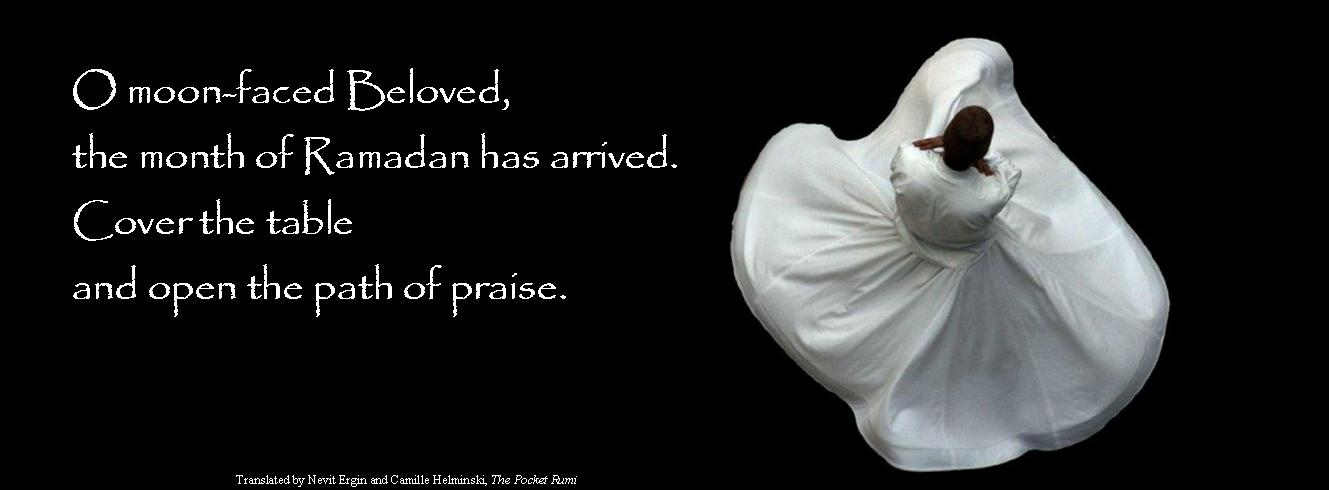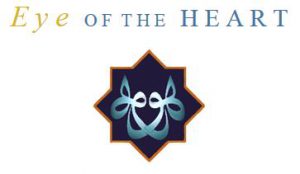
THRESHOLD SOCIETY NEWSLETTER ~ APR 2020
***
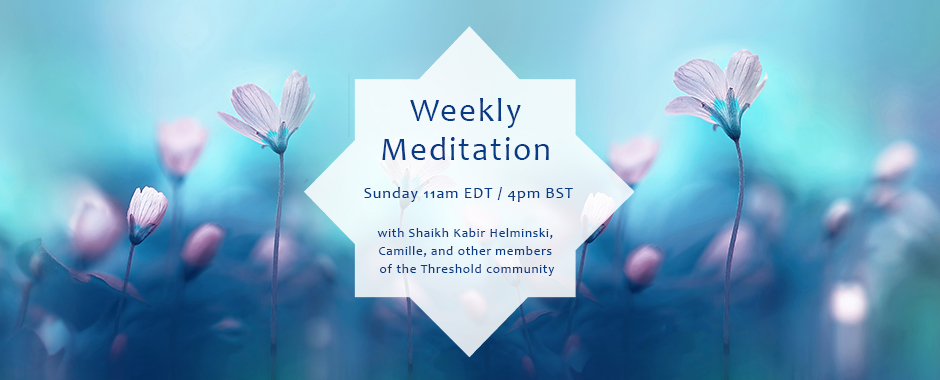
A weekly online meditation with Shaikh Kabir Helminski, Camille, and other members of the Threshold community. Every Sunday at 11am Eastern Daylight Time (4pm BST).
“God will not burden anyone beyond their capacity.” ( لا يكلف الله نفسا إلا وسعها)
How will we endure? We will endure with Rahman, The Divine Compassion & Mercy. We must carry each other. “All believers are brothers/sisters.”
God says, “I am in you. Where are you?” We must find Spirit within ourselves, as Love.
Join us every Sunday on Zoom: https://zoom.us/j/435138208
[If you have not used Zoom before, please allow time to install and test the software before the meeting time. Click the above link and you will be prompted to download.]
Watch the first meditation from last Sunday (Mar 29th).
***
April Theme
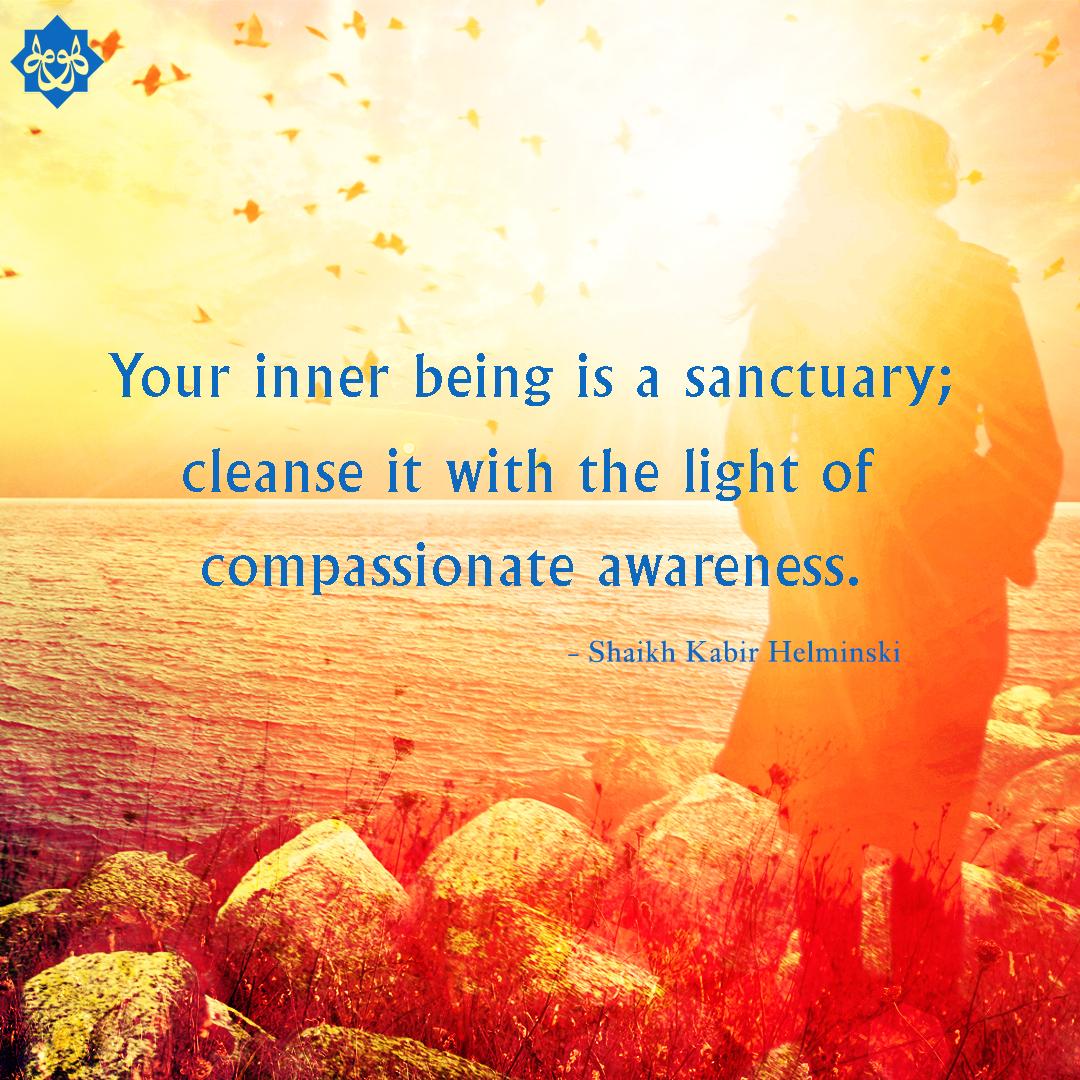
Your inner being is a sanctuary; cleanse it with the light of compassionate awareness.
~ Shaikh Kabir Helminski
We welcome your reflections on this theme.
***
It Is Spring!
~ Camille Helminski, excerpt from A New World

And today it is spring.
Aaron’s rod is flowering.
Joseph’s branch blossoms,
and doves take flight
to nest in our nearby window
in the room held for guests.
Are we not all guests here,
held by Your Love?
A momentary passage
“beneath a palm tree”
or an oak or willow …
bending with Your breeze,
we can hear the river singing;
the Ocean is not far.
Realms of stars sprinkle our nights
with patterns of Light.
And Your whispers
reach us,
even in the dark—
when sometimes we can hear more clearly,
when less distractions mar our minds and hearts,
even though we may miss the sun’s brightness;
ever You are with us—
let us remember.
Let us pray,
until there is no “other” less,
and more in need—
are we not all equal
in our longing,
in our birthright?
Aspirations differ;
some would forget,
amid the world’s paltry pleasures,
lulled by the siren’s song,
distanced from home,
and yet,
we cannot be lost, for You are the Finder,
Most Glorious,
the One and Only
Giver of all that has been
known or will be
needed
or will be returned
into the folds of Your Being,
Expansive,
vast—
wave upon wave of resonance
holds us fast
in Your Love,
in Your Compassion,
in Your Mercy!
Ya Rahman,
Ya Rahim,
Ya Ahad,
Ya Karim,
Ya Wajid,
Ya Wasi,
Ya Wadud!
***
Reflection on March’s theme: Every relationship could be Being knowing Itself.
~ Shaikh Kabir Helminski
~ Fatimah Ashrif [Hale Barns, UK]
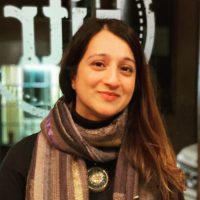 The “lover” in me rises and embraces this statement without a thought, immediately recognising the truth of it though she is still learning what this means and looks like in practice each day. One of the relationships I have been inspired by is that of my father and his best friend, my Chachu (Uncle) Saleem. They met at an engineering college in Khariyaan (Punjab, Pakistan) in their late teens and remained firm friends until my dad’s death some 17 years later. Their friendship was based on a deep and beautiful love – of the type that was common-place amongst men in Pakistan at the time. It wasn’t simply brotherly, and it was not romantic (though whilst my father was still alive, Chachu would joke to my mother that he was the “other woman” in their relationship): it was soul companionship. Somehow, somewhere in their relating they had touched upon the Divine in each other. Chachu Saleem translated this verse for me, from its original Urdu, as a way to help me understand his feelings for my dad: “He was a man, but so beautiful that he got up in my mind like God.”
The “lover” in me rises and embraces this statement without a thought, immediately recognising the truth of it though she is still learning what this means and looks like in practice each day. One of the relationships I have been inspired by is that of my father and his best friend, my Chachu (Uncle) Saleem. They met at an engineering college in Khariyaan (Punjab, Pakistan) in their late teens and remained firm friends until my dad’s death some 17 years later. Their friendship was based on a deep and beautiful love – of the type that was common-place amongst men in Pakistan at the time. It wasn’t simply brotherly, and it was not romantic (though whilst my father was still alive, Chachu would joke to my mother that he was the “other woman” in their relationship): it was soul companionship. Somehow, somewhere in their relating they had touched upon the Divine in each other. Chachu Saleem translated this verse for me, from its original Urdu, as a way to help me understand his feelings for my dad: “He was a man, but so beautiful that he got up in my mind like God.”
I see how I have sought this same type of specialness in some key friendships and even romantic relationships throughout my teens and twenties. Often feeling let down when and if these did not develop as I had hoped, and perhaps not always seeing the ways in which I may have contributed to this. It seems clear to me that it was no coincidence that I was drawn in the end to a tradition which at its heart is about the alchemical nature of love and relationship as modelled by our beloved Mevlana and his beloved Shams.
So how do I understand this statement at this present time? Since all of creation is a manifestation of Divine Being, through a conscious or presence-full relating one can come to know this “Being”, or the qualities of “Being”, directly in another, in oneself, or through the unfolding of the relationship itself as a whole.
Where is this “we” and this “I”?
By the side of the Beloved.
You made this “we” and this “I”
in order that you might play
this game of courtship with Yourself,
that all “you’s” and “I’s” might become one soul
and finally drown in the Beloved.[Mathnawi I: 1779–94, The Pocket Rumi]
As conscious beings, we have a part to play in Being coming to know Itself. If a human being consciously relates with another, then surely “Being” is coming to know and love “Being”.
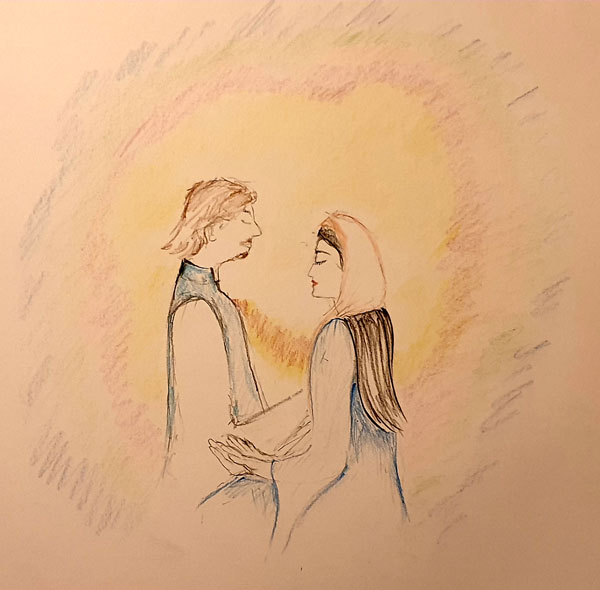
by Fatimah Ashrif
As time passed, I began to notice how life was full of many potentially special relationships, and how many more of my connections with others could begin to take on a special quality or hue depending upon the qualities I consciously embodied in them.
The Beloved, which most people know only in the first moments of romantic love, is in fact present in many faces and guises as our capacity for love grows. This capacity transforms us and makes us feel more alive. We are never so alive as when we are in love, so why should we restrict this love to the almost impossible conditions of romantic love? Can’t we be lovers all the time?
[Living Presence]
Since I started facilitating a zhikr circle, I have become aware of our capacity as a group to consciously love and hold each other in love. This is not (inshallah) a sentimental, superficial or preferential love for those in the group, but something that seems to flow from the continual affirming of La ilaha il Allah – the truth that we are each a manifestation of Spirit – practising what Dede calls the “fruits of love”, our prayer to the Divine to hold us in His/Her love, invoking the blessings of our tradition and our intention to be in presence. To know “Being” is to experience it. This has come about, it seems, through the intention to become empty enough of our egoic pre-occupations to allow the possibility for knowing the other, truly seeing them and not our own projections and transferences. In our zhikr circles, we are encouraged to truly “listen” to our companions as they speak. In that “listening” something quite subtle is happening, love is growing and the Divine is being known, experienced and experiencing itself.
Returning to my youthful longings for deep relationship, in the end as usual, I imagined very small indeed. I was looking only for one special relationship and instead I was gifted the possibility of Divinity knowing itself in all my relating. So many of my relationships with my companions on the path mirror that which my father and his best friend shared, and all have the potential for being a place for self-revelation and Divine revelation.
In this time in which our world is experiencing contraction through physical and material difficulty (so glad to be reminded by Dede recently that “this is not a spiritual crisis”, spirituality is very much alive and enlivening – alhamdulillah), I find myself holding those in our front line: our medical staff and key workers in my prayers, and also those in positions of power and authority, asking that their hearts may be expanded with love and wisdom so that their relating to those under their care might also become a site of tajalli (Divine self-manifestation or even self-discovery) and likewise the same prayer for my own heart and those of each of us.
In our community call a few days ago, I saw nothing but an up-swell of Divine Love (tajalli) as I scanned across the 219 love-filled faces supported by Zoom software. As many of us sit in our homes, transforming them into “sanctuaries of zhikr” as Dede suggested, may our capacity to hold love, to be love, be increased, and may we reach out within our homes and outside of them (without breaching the “lockdowns” to which we are subject) to enLIVEn and enLOVEn our relationships by the various means available to us, enabled by our commitment to and practice of presence. Ameen.
~ Fatimah is a Mevlevi dervish living in a small village in Cheshire. She facilitates the – now weekly – Threshold Wilmslow Circle, and is involved with the work of Rumi’s Circle and RAY.
***
Mevlevi Wird
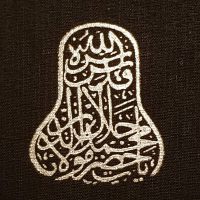 A selection from the Mevlevi Wird (the daily prayer book of Mevlevi dervishes). They are particularly appropriate for these times… and all times:
A selection from the Mevlevi Wird (the daily prayer book of Mevlevi dervishes). They are particularly appropriate for these times… and all times:
I have readied the following words:
Facing all fears, “There is no god but God.” (La ilaha illallah)
Facing all sorrows and sadness, “May it be as God wills.” (Mashallah)
Facing all benefits, “Praise be to God.” (Alhamdulillah)
Facing all abundance, “Thanks be to God.” (Shukrulillah)
Facing all astonishment, “God is subtle beyond all knowing.” (Subhanallah)
Facing all sins, “I ask God’s forgiveness.” (Astaghfirullah)
Facing all scarcities, “God is enough for me.” (Hasbiyallah)
Facing all calamities, “We belong to God and to God we shall return.” (Inna lillahi wa inna ilayhi raji’un)
Facing every event of destiny, “I trust in God.” (Tawakkaltu alallah)
Facing all obedience and disobedience, “There is no means or power in anyone except through God who is the Most High, the Most Great.” (La hawla wala quwwata illa billahil aliyil azeem)
***
The Adab of Your Love
~ Camille Helminski, excerpt from A New World

All we have is Yours;
never have we owned
a thing
without Your providing.
Water gathers in our hands,
for moments
of Your gifting,
then fingers loosen,
and all returns
to this ground
of Your Heavenly Sustenance.
Forever
cycling
through the Voice
of Your Bestowal:
“Be!”[1]
gracious,
everlastingly—
we are called to mirror
Your manner—
the adab[2]
of Eternal Compassion.
Ya Rahman!
Ya Rahim!
Ya Razzaq!
Ya Samad!
Ya Wadud![3]
[1]His being alone is such that when He wills a thing to be, He but says to it, “Be”—and it is.
Limitless, then, in His glory is He in whose hand rests the mighty dominion over all things; and to Him will you all return! [Surah Ya Sin, O Thou Human Being, 36:82-83]
[2]Adab, spiritual courtesy, loving attentive response in the moment to whatever is present, whatever the need (whether of strength or of beauty, jalal or jamal).
[3]Ya Rahman! O Infinite Compassion! Ya Rahim! O Infinite Mercy! Ya Razzaq! O Provider of All! Ya Samad! O Eternal Satisfier of All Needs! Ya Wadud! O Infinite Love!
***
Spiritual Imagination
~ by Jeremy Henzell-Thomas
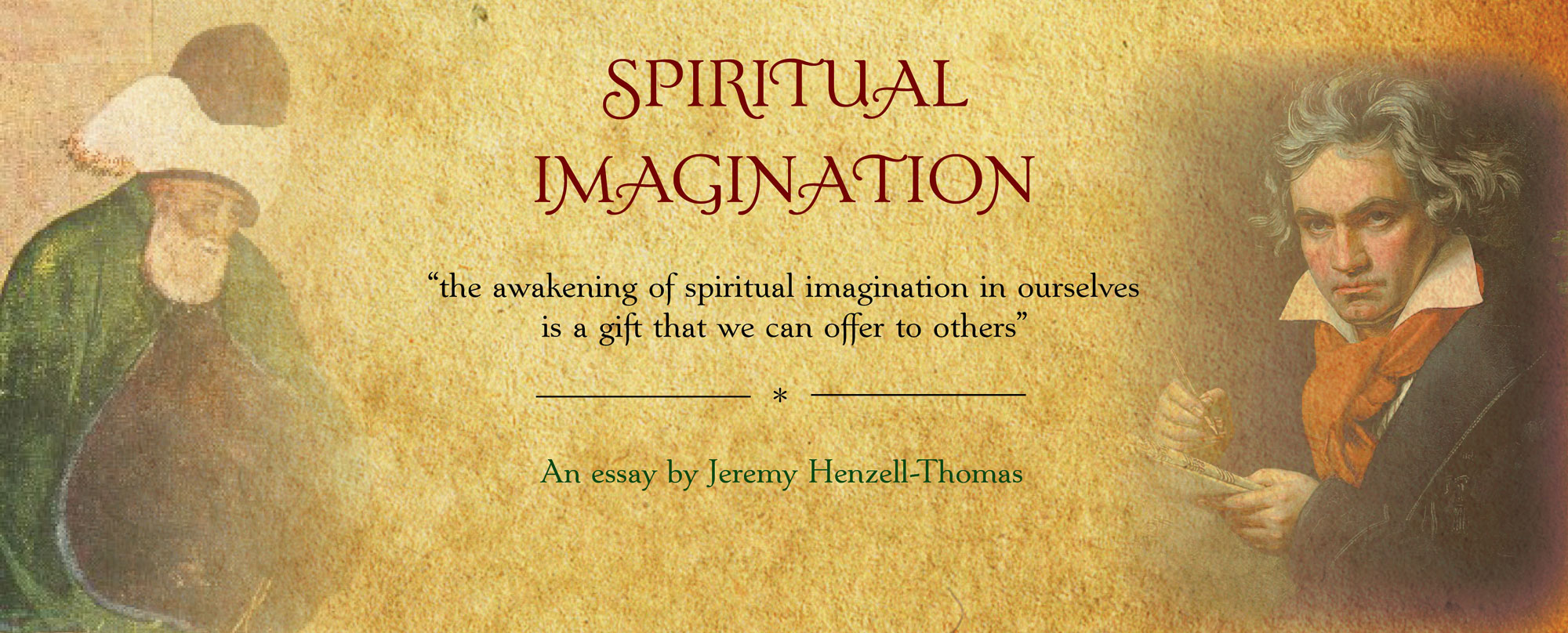
So, what is spiritual imagination? Let’s start with just imagination.
The dictionary tells us that this is the ability to form images or pictures in the mind, or think of new ideas. So it’s the faculty that enables us to tell stories, write novels, to visualize and envisage, and also to envision the possibility that something good might happen in the future. We are often called upon to imagine a better future, but not in the sense of some utopian fantasy, rather in the sense of describing how a positive vision of that future might be realized, especially in the interest of young people, who are the future. And the new buzz word is to re-imagine, to revise or reform an outdated view of the world. To continually update our guiding myths and stories about ourselves, our societies and the wider world, and this takes imagination.
There’s a very good little book by Alex Evans entitled The Myth Gap: What Happens When Evidence and Arguments aren’t Enough. He says that:
…once upon a time our society was rich in stories. They united us and helped us understand the world and ourselves. We called them myths. In this time of global crisis and transition – of mass migration, inequality, resource scarcity and climate change – it is only by finding new myths, those that speak to us of renewal and restoration, that we will navigate our way to a better future. It is inspiring stories, rather than facts and pie-charts, that have the power to animate us and bring us together to change the world.
That is why the Greta Thunbergs of the world make such waves, and why they are also attracting so much abuse online. But from whom? Well, the best description of these detractors I have seen is that they are those ‘who see their obsolescence hurtling towards them.’ In other words, all those (and it’s often sad, scared old men) disturbed by the visionary ideals of the young. Well, I would say to them, ‘Your time’s up.’ History is stacked with examples of the old guard redoubling its efforts to resist impending change or even retreat to the olden days.
Now you may well ask, what has all this talk about re-imagining the future and changing the world got to do with spiritual imagination, which surely has more to do with mystical awareness and personal transformation than radical, progressive politics. As the Qur’an tells us: God does not change the condition of a people until they change what is in themselves [13:11].
***
Ya Shafi, Ya Kafi, Ya Muafi

A zhikr offering from the Kendal and Wilmslow circles current daily practice. Listen and download:
Ya Shafi, Ya Kafi, Ya Muafi—“O Healer, You Who Cure Us, O You Who Are Enough, O Healer and Restorer” is a prayer offered for healing, including Names beyond the traditional list of the Ninety-Nine Names, acknowledging the total healing capacity of the Divine to restore us better than before any illness. It is derived from the prayers of the Prophet Muhammad, and the Quranic verse: Is not God enough for His/Her servants? [39:36]
~Ninety-Nine Names of the Beloved by Camille Hamilton Adams Helminski
The Threshold Society
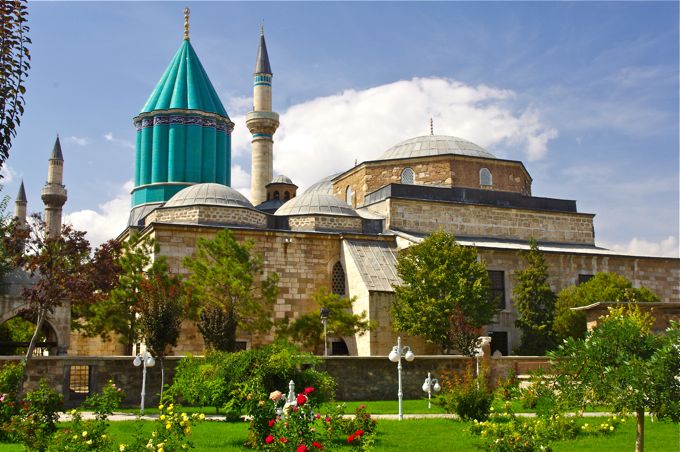 The Threshold Society, rooted within the traditions of Sufism and inspired by the life and work of Mevlâna Jalâluddîn Rumi, is a non-profit educational foundation with the purpose of facilitating the experience of Divine Unity, Love, and Truth in the world. Sufism is a living tradition of human transformation through love and higher consciousness. Our fundamental framework is classical Sufism and the Qur’an as it has been understood over the centuries by the great Sufis. The Society is affiliated with the Mevlevi Order, and offers training programs, seminars and retreats around the world.
The Threshold Society, rooted within the traditions of Sufism and inspired by the life and work of Mevlâna Jalâluddîn Rumi, is a non-profit educational foundation with the purpose of facilitating the experience of Divine Unity, Love, and Truth in the world. Sufism is a living tradition of human transformation through love and higher consciousness. Our fundamental framework is classical Sufism and the Qur’an as it has been understood over the centuries by the great Sufis. The Society is affiliated with the Mevlevi Order, and offers training programs, seminars and retreats around the world.
Each month we intend to highlight an article about our lineage and its principles. This month we offer: Lessons in the School of Love: The Adab of Sacred Space.
Sufi training is accomplished, above all, in the Sufi lodge and the network of relationships cultivated there. Sometimes the Sufi lodge is an actual tekkye or dergah, a private home, a rented hall, and sometimes it may even be a “tekkye on wheels,” as when we travel to a foreign country together. What is most important is the intention and an understanding of why we come together. We are seeking to create and sustain an environment where spiritual realization can be optimized, where the influence of egoism can be minimized, and where the values and knowledge of the tradition can be preserved.
When we step over the threshold of the Sufi tekkye (lodge) we are leaving one world and entering another. We are leaving the environment of the mundane and entering sacred space. We do this, above all, with our intention. Our intention is to be present, courteous, and aware of our own self (nafs).
***
Online Ecourses with Spirituality & Practice
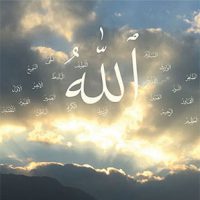 We have eight on-demand ecourses offered through Spirituality & Practice that you can access at any time. We particularly recommend the Ninety-Nine Names of God which was offered during Ramadan a few years ago.
We have eight on-demand ecourses offered through Spirituality & Practice that you can access at any time. We particularly recommend the Ninety-Nine Names of God which was offered during Ramadan a few years ago.
The Compassionate (ar-Rahman), the All-Seeing (al-Basir), the Manifest (az-Zahir). These are but three of the 99 Qualities or “Names” of God intrinsic to the Islamic tradition. This e-course, open to people of all backgrounds, explores the interplay of the Names in our lives and leads us on a journey of discovery and renewal. The Names serve as a doorway to self-knowledge and intimacy with our Sustainer. Focusing on the Names can provide substantial nourishment in realms of heart and soul. Anyone who engages with them in yearning finds a pathway to a deeper connection with Enlivening Spirit. Includes video meditations and audio zhikr by Camille Helminski.
See the full list of available ecourses here.
***
The Invisible Rain of Ramadan
Ramadan comes glowing
after night’s long hours.
Ramadan comes to earth
thirsting for fresh rain.
Ramadan comes like a friend
embracing with strong arms.
Ramadan opens the door
of our invisible home.
~Kabir Helminski
Ramadan has so many dimensions: purification, sacrifice, community, the still and subtle emptiness of the heart. It reorients us in so many ways. Ramadan is less something that we do—instead it is a force field we enter and are transformed by. But it does take intention and effort on our part. If we can, we participate in the fast. Perhaps we also find other intentions, new aspects of awareness that become part of this sacred time. I’d like to share something I’ve learned.
There are some things we habitually give our attention to that drain us, or reduce our spiritual attunement, things that we take for granted as aspects of modern life: the media, entertainment, the internet. If we pay careful attention to the state that is created as a result of our communing with these sources and how much time we give to them, we might learn something important.
Conversely, if we pay attention to the state we experience when we turn toward trusted spiritual sources, we may begin to discern a significant difference. Some things drain us and some things replenish us.
Ramadan is a time to notice what we give our attention to, what energizes us, in contrast to what drains us of joy, love, peace, hope.
***
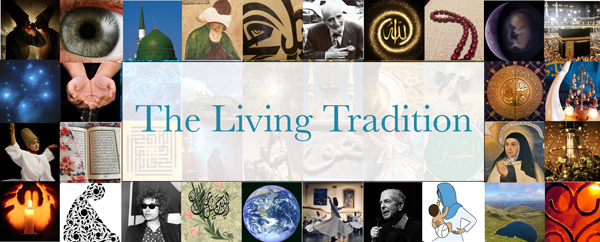
Threshold’s collaborative blog channel The Living Tradition on Patheos.com is reaching new audiences and sharing the experiences of our community in a unique and vibrant way.
Let us know what you think by commenting on the posts — join the discussion at www.patheos.com/blogs/livingtradition and “follow” The Living Tradition.
Recent articles:
Meeting Muhammad by Anna Rohleder
A New Future: Emerging Communities of Care by Saimma Dyer
***
Recent Publications

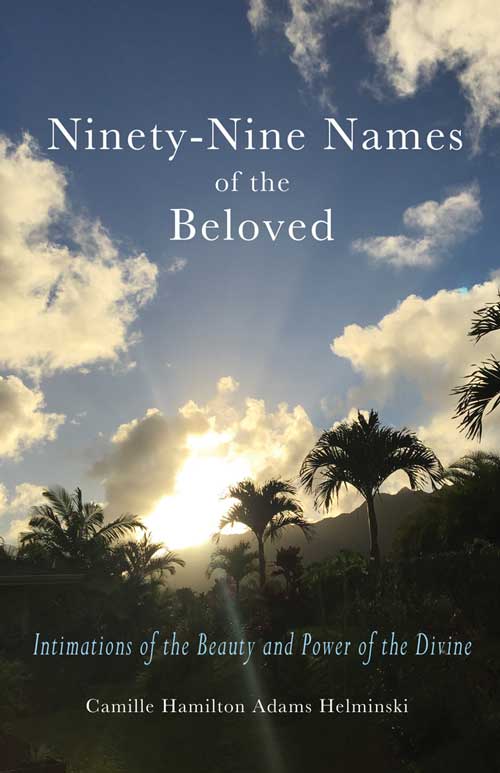
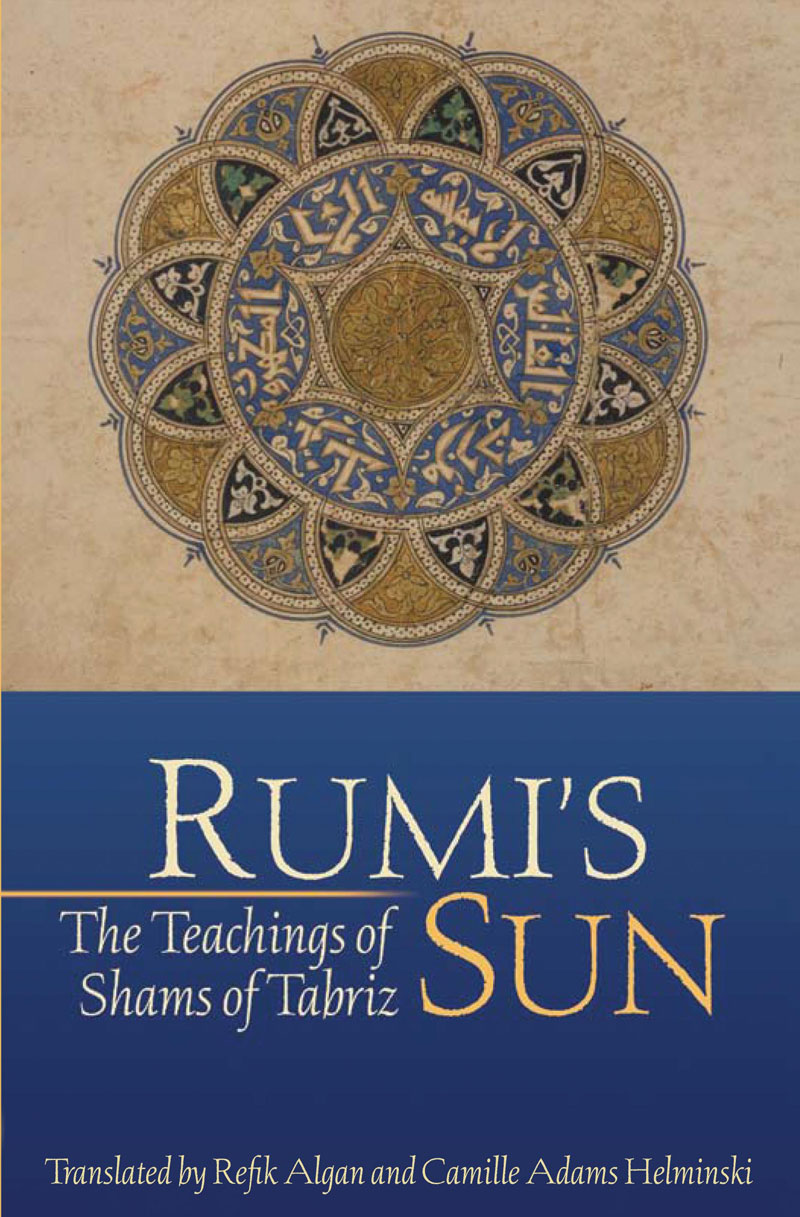
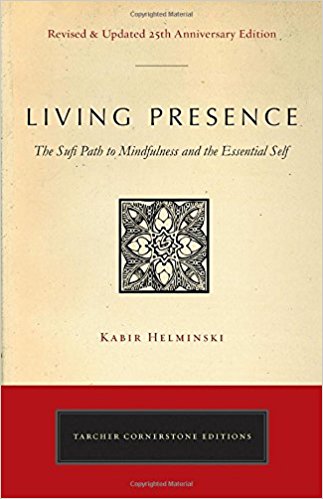
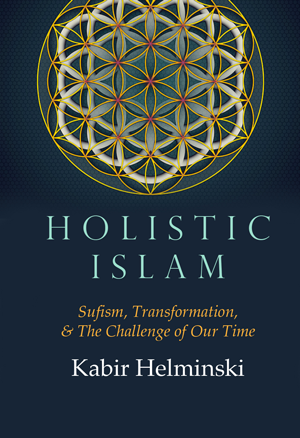
We encourage you to leave reviews on Amazon.
And remember you can donate to Threshold Society through Amazon Smile.
For AmazonSmile US: smile.amazon.com
For AmazonSmile UK: smile.amazon.co.uk
We appreciate your support.
***
Calendar
Apr 23: Ramadan
May 24: Eid al-Fitr
Jul 31: Eid al-Adha
TBC Aug 22: Portland, Oregon. Day retreat with Kabir & Camille. (KC)
Events with Kabir (K) & Camille (C)
***
We’d love to hear from you – get in touch at eyeoftheheart@sufism.org
***
Find out how to support the work of Threshold Society.
***
Receive this newsletter by email: sign-up here.


